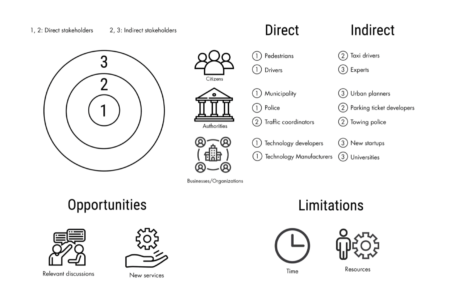Responsible digital technologies in public spaces
Mar 2020 - ongoing
What are the ethical issues of applying artificial intelligence in a city context? The Scan Car of the city of Amsterdam is the use case to explore the impact and discuss values of different stakeholders.
The Municipality of Amsterdam is increasingly developing and using Artificial Intelligence technologies to address key urban problems. One prominent case is the use of “intelligent” digital technologies called Scan car , a camera-equipped car for identifying illegally parked vehicles and automatically issuing parking fines. Similar uses of cameras and image recognition is now being investigated for a range of new use cases such as detecting trash on road sides and automatically taxing businesses for storefront advertisement.
The municipality recognizes the ethical issues of Artificial Intelligence and has a strong interest in ensuring that digital technologies are used in an ethical and responsible way. Specifically, the municipality has developed a Digital Agenda [1] that outlines the vision of a “free, inclusive digital city”. This agenda lays out concrete priorities related to digital rights, privacy, data use, and citizen inclusion, partially inspired by the TADA manifesto [2].
Stakeholders
The Scan Car and related future use cases touch upon the interest of many stakeholders, such as:
- People of Amsterdam (Citizens)
- Authorities
- Businesses/ Organizations

The use of AI in scan cars will affect citizens (and businesses) in a direct and indirect ways. Increasingly, citizens and businesses will be subject to automated decision making systems that are complex to understand and whose decisions are difficult to appeal. From the authorities the Municipality is responsible for deciding for what and where this technology will be used and how it will be monitored and governed. Most critically, the municipality has the mandate to ensure that all digital projects conform to the principles laid out in the Digital Agenda. Lastly the Scan car technology developers and manufacturers have a key role in determining the overall functionality, appearance, and user experience, as well as specifics of data collection, data management, data analyze and algorithms.
Prior Work
Prior work on design on a future scan car by UNSense [3] indicated a range of possibilities for tackling potential ethical and social issues. However, this work was not informed by a rigorous analysis of stakeholder interests and concerns and especially lacks a clear understanding of how citizens perceive and experience smart digital technologies in the city. The TADA principles (Figure 2 below) highlight a range of further design options which so far have not been explored. In recent months, the researchers, companies and governments have develop extensive guidelines for ethical and responsible AI [4,5]. However, as of now it is unclear how these high-level principles and guidelines can be applied.
References:
1. Gemeente Amsterdam. (2019, March). Agenda Digital City.
2. Gemeente Amsterdam. (2019, June). tada. Retrieved from https://tada.city
3. AMS research Institute. UNSense. Designing the Human – Scale Scan car.
4. European Parliament. (2019, September). EU guidelines on ethics. Retrieved from https://www.europarl.europa.eu/
5. A. Hashmi. (2019, Feb). AI Ethics: The Next Big Thing In Government. Retrieved from
https://www.worldgovernmentsummit.org/